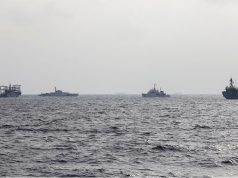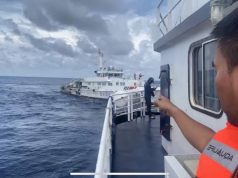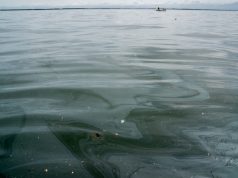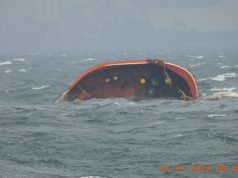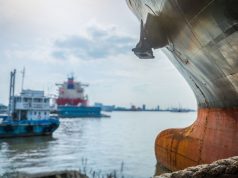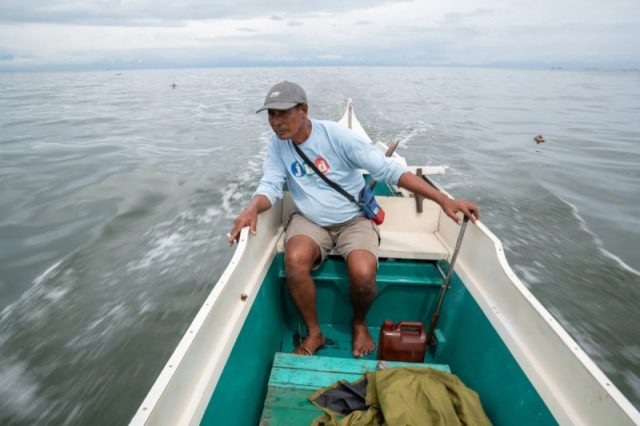
- Oil tanker sank in Manila Bay during a storm
- Major oil spill caused fishing bans in affected towns
- Thousands of fishers demand for compensation
LIMAY, Philippines (Thomson Reuters Foundation) — Efren Dominico has been a fisherman in the Bay of Manila in the Philippines for 43 years and survived countless storms, but nothing prepared him for the day when an oil tanker sank off the coast in July and cut him off from his livelihood.
The motor tanker Terranova capsized and sank off the tow of Limay, on the western side of Manila Bay, carrying 1.4 million liters of oil, the largest oil spill in the country since 2006.
Days later, two more fuel tankers sank off the coast of a neighboring town, further polluting the bay, a major fishing ground serving the capital and vital spawning grounds for small fish like sardines, mackerel, slipmouth and anchovies.
The Bureau of Fisheries and Aquatic Resources (BFAR) immediately issued a warning against the consumption of seafood from the affected areas, while local governments on either side of the bay banned fishing.
That all but cut people working in the fishing industry off from their source of income.
“Since July, fishermen in Limay have been struggling to survive,” Dominico, 53, told the Thomson Reuters Foundation.
“We read the promises of financial assistance from politicians’ Facebook pages, but … we have yet to receive financial aid aside from some canned goods,” he said.
The Department of Interior and Local Government formed a task force to clean up the oil spill and the Department of Justice said it was investigating whether the sunken ships were involved in oil smuggling.
Philippines most at risk of disasters
By early September, the government had siphoned most of the remaining oil from the Terranova.
But by then, the fishing bans and shrinking demand for seafood had plunged people working in the sector deeper into debt and hunger.
Greenpeace Philippines campaigner Khevin Yu said the “twin disasters” of the oil spill and the storm in which the ship sank showed the Philippines was at the front line of the climate crisis.
The Philippines topped the World Risk Index of countries most at risk of disasters for the third straight year in 2024.
“The oil industry is one of the main reasons we are experiencing these catastrophic extreme weather disturbances … and fossil fuel operations were also affected by the problems that they have created. These eventually affected the fishermen and Manila Bay,” Yu said.
BFAR lifted its warning in late August, but the fishing bans lasted for more than a month in some areas.
The department estimated total monthly losses for thousands of people in the fishing sector of 84 million pesos ($1.5 million) in Bataan province on the west of Manila Bay and more than 70 million pesos in Bulacan and Pampanga provinces to the north.
Oil spills are the costliest human-induced disaster in the country, accounting for P4.93 billion in damages in 2023, according to the Philippine Statistics Authority.
‘No plan’
But despite the fishing bans and the risk of being caught, fishermen said they had to go to sea to try to make a living.
“The government should have made sure first that fishermen had alternative sources of income or sufficient aid before they banned fishing,” said Dominico.
Fishers said the Terranova had destroyed their fishing grounds for squid and some big fish.
Hundreds of fishmongers like Veronica Samson Roque, 29, also suffered large income losses after the disaster.
Roque said she now had to sell 1 kg of fish for half the normal price with customers fearing fish could taste like oil.
“My weekly earnings are now reduced to around 1,000 pesos, and it’s not enough to feed my family of four and send my children to school,” she said.
Fishers in Limay believe it will take a few months more to revive their fishing grounds and seafood safety fears, as happened when an oil spill hit their town in the 1990s.
According to the international ocean conservation advocacy organization Oceana, oil spills could destroy the habitats of mangroves, coral reefs and seagrass beds, and could leave a trail of destruction lasting decades.
“Even after the oil pollution is cleaned up … the people of the Philippines will be dealing with the impacts of this devastation long after the headlines fade,” Gloria Estenzo Ramos, Oceana Philippines vice president, said in a statement.
Yu said previous oil spills had long-term effects on marine life, but the environmental impact of the Terranova sinking was not yet known.
“That means for the fisherfolk, there’s no guarantee that the fish that they will catch in the succeeding weeks and months will be free from contamination,” he said.
Fishermen like Dominico, who are part of the Pagkakaisa ng mga Samahan ng Mangingisda (Pangisda), an association of small-scale, municipal and subsistence fishers, are demanding compensation from the ship-owner and the state for their income loss due to the oil spill.
Pangisda said the government’s “knee-jerk” ban on fishing did not include a plan to provide alternative income for small fishers.
Pangisda also called for an investigation into authorities who allowed the Terranova to sail during a storm, causing irretrievable losses to fishing communities like Limay.
But Dominico, like many others, was not optimistic.
“Maybe the sunken ship will float before help reaches us,” said Dominico. “We have already sacrificed a lot.”
—Reporting by Mariejo Ramos; Editing by Amruta Byatnal and Jon Hemming




